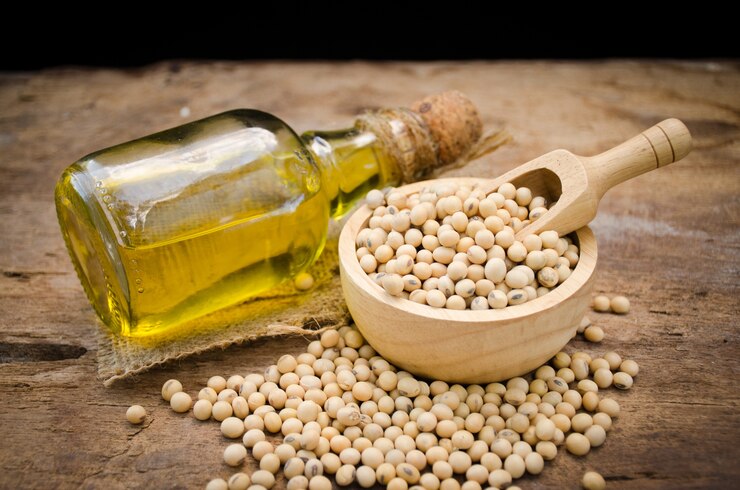The culinary world has long been dominated by a variety of oils, each with its unique properties and health implications. Among these, soybean oil has gained significant attention due to its widespread use in cooking and food production. However, with the growing trend towards organic products, many consumers are left wondering whether organic soybean oil is indeed healthier than its conventional counterpart.
This article delves into the nuances of both types, exploring their nutritional profiles, production processes, and potential health benefits, providing a comprehensive understanding for those seeking the best options for their diets.
Understanding Soybean Oil: Organic vs. Conventional
At its core, soybean oil is extracted from the seeds of the soybean plant, a staple in both agricultural and culinary practices worldwide. The difference between organic and conventional soybean oil lies primarily in the methods of cultivation and production. Organic soybean oil is sourced from soybeans that are grown without the use of synthetic pesticides, herbicides, or genetically modified organisms (GMOs). This organic farming practice emphasizes a holistic approach to agriculture, prioritizing biodiversity and soil health, which can lead to a more nutrient-rich end product.
Conversely, conventional soybean oil may come from soybeans treated with various chemicals during their growth cycle. These chemicals can include synthetic fertilizers and pesticides, which, while effective in increasing crop yields, raise concerns about their residual effects on human health and the environment. Studies have indicated that the consumption of oils derived from conventionally grown crops may be linked to various health issues, including inflammation and chronic diseases. The implications of these differences in agricultural practices extend beyond nutritional content and speak to broader concerns about food safety and environmental sustainability.
Nutritional Profile: What Sets Them Apart?
When examining the nutritional profiles of organic and conventional soybean oil, the differences may not always be immediately apparent. Both types of oil are primarily composed of polyunsaturated fats, which are considered beneficial for heart health. They are also rich in omega-6 fatty acids, which play a vital role in various bodily functions. However, the quality of these fats can be influenced by the growing conditions of the soybeans.
Organic soybean oil is often touted for its higher antioxidant content, which can be attributed to the absence of chemical fertilizers and pesticides. Antioxidants are crucial in combating oxidative stress in the body, which is linked to numerous health conditions. In contrast, conventional oils may undergo more processing, which can diminish their natural nutrient content and introduce harmful trans fats during refining. The process of hydrogenation, commonly used in the production of conventional oils to increase shelf life and stability, can lead to the formation of trans fats, known for their adverse health effects, including increased risk of heart disease.
Health Benefits: Which Oil Reigns Supreme?
The health benefits of using organic soybean oil extend beyond its nutritional profile. Research has indicated that oils derived from organic sources often contain higher levels of beneficial compounds, such as tocopherols and phytosterols. Tocopherols, a form of vitamin E, are essential for maintaining healthy skin and eyes, while phytosterols can aid in lowering cholesterol levels and improving heart health.
Moreover, the absence of synthetic chemicals in organic soybean oil means that consumers can enjoy their cooking with greater peace of mind. The potential risks associated with consuming traces of pesticides and other harmful substances present in conventional oils have led many health-conscious individuals to seek organic alternatives. The environmental benefits of choosing organic also resonate with consumers who are increasingly aware of the impact of their food choices on the planet. Supporting organic farming practices contributes to sustainable agriculture, promotes biodiversity, and fosters healthier ecosystems.
Culinary Uses and Considerations
From a culinary perspective, both organic and conventional soybean oils possess a high smoke point, making them suitable for various cooking methods, including frying, sautéing, and baking. However, the flavor profile of organic soybean oil is often described as more robust and slightly nutty, which can enhance the overall taste of dishes. Chefs and home cooks alike appreciate the versatility of soybean oil, as it can seamlessly blend into a range of recipes, from dressings to marinades.
When deciding which oil to incorporate into a diet, it's essential to consider not only the health benefits but also personal preferences and cooking styles. While organic soybean oil may offer superior health advantages and environmental sustainability, conventional soybean oil remains a more accessible option for many consumers due to its lower cost and widespread availability. The choice ultimately lies in aligning one’s values with their dietary needs and lifestyle.
Conclusion: Making the Right Choice for You
In summary, the debate over whether organic soybean oil is healthier than conventional soybean oil is nuanced and multifaceted. While both oils offer essential fatty acids and versatile culinary applications, organic soybean oil stands out due to its higher antioxidant levels, absence of harmful chemicals, and support for sustainable farming practices. As consumers become increasingly knowledgeable and concerned about the quality of their food, choosing organic options can lead to better health outcomes and a positive impact on the environment.
For those looking to incorporate organic soybean oil into their cooking, AllyOrganics offers a range of high-quality organic products that align with health-conscious choices. By prioritizing organic ingredients, consumers can enjoy the benefits of healthier cooking while supporting sustainable agricultural practices.





Comments